
Holyoke is a city in Hampden County, Massachusetts, United States, that lies between the western bank of the Connecticut River and the Mount Tom Range. As of the 2020 census, the city had a population of 38,247. Located 8 miles (13 km) north of Springfield, Holyoke is part of the Springfield Metropolitan Area, one of the two distinct metropolitan areas in Massachusetts.

Westfield is a city in Hampden County, in the Pioneer Valley of western Massachusetts, United States. Westfield was first settled by Europeans in 1660. It is part of the Springfield, Massachusetts Metropolitan Statistical Area. The population was 40,834 at the 2020 census.

The Pioneer Valley is the colloquial and promotional name for the portion of the Connecticut River Valley that is in Massachusetts in the United States. It is generally taken to comprise the three counties of Hampden, Hampshire, and Franklin. The lower Pioneer Valley corresponds to the Springfield, Massachusetts metropolitan area, the region's urban center, and the seat of Hampden County. The upper Pioneer Valley region includes the smaller cities of Northampton and Greenfield, the county seats of Hampshire and Franklin counties, respectively.

The Pioneer Valley Transit Authority (PVTA) oversees and coordinates public transportation in the Pioneer Valley of Western Massachusetts, offering fixed-route bus service, paratransit service, and senior van service. PVTA was created by Chapter 161B of the Massachusetts General Laws in 1974. Based in Springfield, Massachusetts, PVTA serves Hampden and Hampshire counties, and provides connecting service to CTtransit in Hartford County, Connecticut, to FRTA in Franklin County, and to WRTA in Worcester County. It is the largest regional transit authority, and second largest public transit system in Massachusetts after the Massachusetts Bay Transit Authority, providing service to over 11 million riders annually across 24 municipalities in the region, with about 70% of all riders using the system as their primary mode of transit.

Western Massachusetts, known colloquially as "western Mass," is a region in Massachusetts, one of the six U.S. states that make up the New England region of the United States. Western Massachusetts has diverse topography; 22 colleges and universities including UMass in Amherst, MA, with approximately 100,000 students; and such institutions as Tanglewood, the Springfield Armory, and Jacob's Pillow.
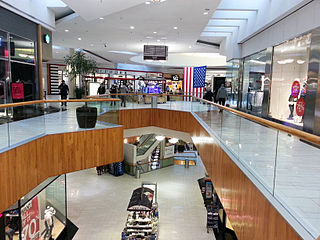
The Holyoke Mall at Ingleside is a shopping center located in Holyoke, Massachusetts, in the city's Ingleside neighborhood. It is owned by The Pyramid Companies. The mall features 135 stores, a large food court, and several restaurants and is 1.6 million square feet, the third-largest in New England by retail space. The mall features the anchor stores Macy's, JCPenney, Target, Best Buy, Burlington, and Hobby Lobby.
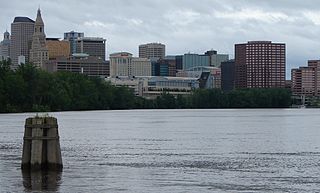
The greater Hartford–Springfield area is an urban region and surrounding suburban areas that encompasses both north-central Connecticut and the southern Connecticut River Valley in western Massachusetts; its major city centers are Springfield, Massachusetts and Hartford, Connecticut.
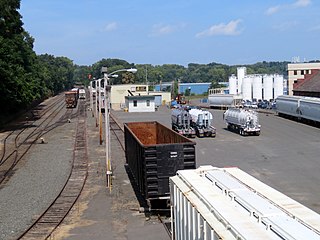
The Pioneer Valley Railroad, founded in 1982, is a Class III short line freight railroad operating the former Conrail trackage in the western part of Massachusetts in towns of Westfield, Holyoke, and Southampton. The railroad has been owned by the Pinsly Railroad Company since its founding, with headquarters in Westfield, Massachusetts.

Mercy Medical Center is located in Springfield, Massachusetts. Founded by the Sisters of Providence Health System, Mercy Hospital is a faith-based, non-profit organization serving patients regardless of background or beliefs. Mercy Medical Center is known for its tradition of holistic health care.

The Paramount Theater is an historic theater located at 1676-1708 Main Street in Springfield, Massachusetts. Built in 1926 out of part of the grand Massasoit House hotel at a cost of over $1 million, the Paramount Theater was the most ornate picture palace in Western Massachusetts. As of 2011, The Paramount is in the midst of a $1.725 million renovation to once again become a theater after decades as a disco and concert hall,, when it was the center of Springfield's club scene. In 2018 the building's owners, the New England Farm Workers Council, announced plans to redevelop it in tandem with a new adjacent hotel building. In a push to renovate the Paramount along with Holyoke's Victory Theater, in October 2018, the administration of Massachusetts Governor Charlie Baker announced a $2.5 million grant to assist the project, on top of a $4 million federal loan guarantee. Pending finalizing funding for the combined restoration and new hotel, no construction timeline has been presented as of 2024.

Alex Benjamin Morse is an American politician who served as the 44th mayor of Holyoke, Massachusetts from 2012 to 2021. A member of the Democratic Party, he was elected the youngest mayor of Holyoke at age 22. He was reelected three times, with his final term expiring in January 2022. Morse resigned on March 26, 2021, to accept a position as the town manager of Provincetown, beginning on April 5, 2021.

MGM Springfield is a hotel and casino complex situated in the heart of Metro Center, Springfield, Massachusetts, United States. Opening on August 24, 2018 in a block of buildings that are historically or culturally influential to Springfield, it became the first resort casino in the Commonwealth. It is owned by Vici Properties and operated by MGM Resorts International. It was temporarily closed on March 14, 2020, due to the COVID-19 pandemic. It reopened to the public on July 13, 2020, after nearly 4 months of being closed, with safety precautions and reduced capacity in place. Chris Kelley is the current President and COO of the MGM Springfield.
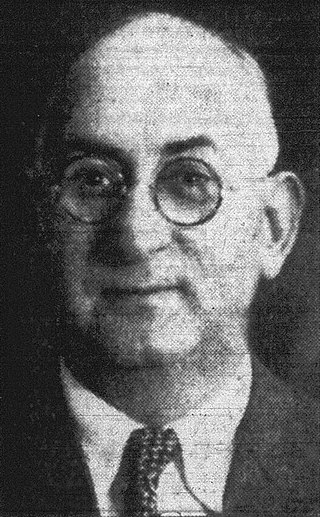
Oscar Beauchemin was an American architect, and civil engineer based out of Holyoke, Massachusetts who designed a number of tenements and commercial blocks in the Greater Springfield area, and whose work was prominent in the Main Street architectural landscape of the Springdale neighborhood of Holyoke, Massachusetts.

Rock Valley, sometimes referred to as West Holyoke, is a neighborhood in Holyoke, Massachusetts located to the west of the city center, approximately 3 miles (4.8 km) from downtown, bordering Easthampton, Southampton, Westfield, and West Springfield. Rock Valley is historically Holyoke's second oldest village after Elmwood, with its eponymous burial ground dating to around 1777, and families having settled in the area as early as 1745. Predating the construction of the Hadley Falls Dam, it originated as the western section of the 3rd parish of West Springfield. Today, the neighborhood contains several historic Federal and Colonial homesteads, in addition to many modern developments adjacent to agricultural and wetland tracts.

Churchill is a neighborhood in Holyoke, Massachusetts located to the south of the city center, adjacent to the downtown. Its name is a geographic portmanteau as the area was historically known as the Church Hill district prior to its extensive development in the early twentieth century. Located at the southwestern edge of the downtown grid, the area served as housing for mill workers in the late nineteenth and early twentieth century and today contains 166 acres (67 ha) of mixed residential and commercial zoning, including a number of historical brick tenements as well as the headquarters of the Holyoke Housing Authority, Holyoke Senior Center, Churchill Homes public housing, and the Wistariahurst Museum.
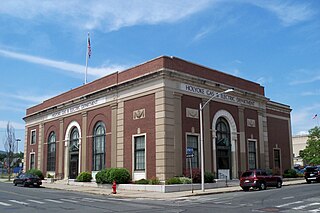
Holyoke Gas & Electric (HG&E), formally known as the City of Holyoke Gas & Electric Department (HGED), is a municipal electric, gas, and telecommunications utility primarily serving Holyoke and Southampton, Massachusetts, one of two in Massachusetts which provide all three services. Founded in 1902 with the purchase of gas and electric plants from the Holyoke Water Power Company, the municipal corporation launched its first fiber optics communications services in 1997. On December 14, 2001 the City of Holyoke purchased the majority of the remaining assets and operations of the Holyoke Water Power Company from Northeast Utilities and as a result the municipal utility assumed control of the Holyoke Dam and Canal System and an electric distribution system serving industrial electric customers in the flats neighborhood. The utility discontinued district steam service to conserve energy used in aging infrastructure in September 2010. Using hydroelectric power generation in tandem with a series of solar panel facilities, the utility has among the lowest rates in the Commonwealth, and as of 2016 between 85% and 90% of the city's energy output was carbon neutral, with administrative goals in place to reach 100% in the next decade.

Whiting Street Reservoir, often shortened as Whiting Reservoir a Class I hazard reservoir, is an auxiliary drinking supply for the city of Holyoke, Massachusetts. The reservoir has an impound capacity of more than 479 million gallons of water and a safe yield of 1.5 million US gallons (5,700 m3) of water per day.
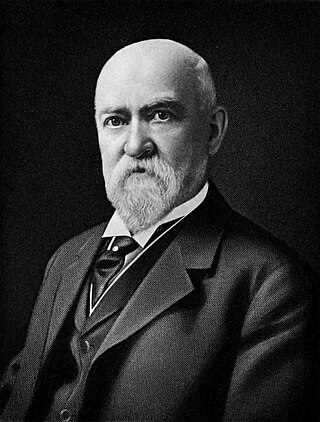
Eugene C. Gardner (1836–1915) was an American architect and author of Springfield, Massachusetts. Gardner was noted both for the architectural influence of his extensive practice as well as his writings on the American home. Gardner was the most notable architect of Springfield.

Joshua A. Garcia is an American politician from Holyoke, Massachusetts. He was elected Mayor of Holyoke in 2021, and is the first Latino to serve as mayor of Holyoke.























